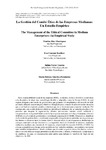La gestión del comité ético de las empresas medianas: un estudio empírico

Use este enlace para citar
http://hdl.handle.net/2183/34897
A non ser que se indique outra cousa, a licenza do ítem descríbese como Atribución-NoComercial 4.0 Internacional
Coleccións
- Investigación (FTUR) [37]
Metadatos
Mostrar o rexistro completo do ítemTítulo
La gestión del comité ético de las empresas medianas: un estudio empíricoTítulo(s) alternativo(s)
The Management of the Ethical Committee in Medium Enterprises: An Empirical StudyAutor(es)
Data
2023Cita bibliográfica
Ríos-Manríquez, M., Conraud Koellner, E., Ferrer Guerra, J., & Sánchez-Fernández, M. D. (2023). La Gestión del Comité Ético de las Empresas Medianas: Un Estudio Empírico. RPER, (66), 63–80. https://doi.org/10.59072/rper.vi66.40
Resumo
[Resumen]: En la responsabilidad social de las empresas (RSE), los dueños, socios o directivos se enfrentana la disyuntiva de elegir una metodología flexible y adaptable, como la Norma SGE21, la cualsugiere designar a un comité de gestión ético que garantice el cumplimiento del modelo de RSE adoptado, alineado a su estrategia y objetivos. Designado por el consejo de administración, situación que es normal en empresas grandes, estructura que no es la misma para empresas medianas. Por consiguiente, este estudio tiene tres objetivos: identificar la influencia de las variables alta dirección, personas que integran la organización, clientes, proveedores, entorno social, ambiental y competencia en la responsabilidad social de las empresas medianas de Celaya, Guanajuato, México (RSEM) y en el comité de gestión ético y socialmente responsable (CGESR). El tercero es identificar si el comité de gestión ética y socialmente responsable otorga la misma prioridad en su gestión que los dueños o directivos hacia la Norma SGE21. Para tal efecto, la investigación se aborda bajo un enfoque cuantitativo de tipo descriptivo y de regresión lineal por el método de mínimos cuadrados ordinarios, mediante una muestra de 82 empresas, proponiendo los modelos RSEM y CGERS. La evidencia estadística revela que en los modelos no hay variables omitidas y no requieren incorporar más variables independientes. Siendo evidente que el comité de gestión ética y los dueños, socios o directivos coinciden en otorgar prioridad a la alta dirección y clientes, evidenciando la importancia de establecer un canal de comunicación entre ambos para trabajar en beneficio del logro de sus objetivos y la RSE. [Abstract]: In Corporate Social Responsibility (CSR), the owners, partners and directors go against the dilemma of choosing between an adaptable and flexible methodology, like the SGE21 Norm, that suggests the designation of a committee of ethical management in charge of ensuring the compliance of the adopted CSR, aligning their strategy and goals. This committee is typically appointed by the administrative council, this is fairly normal in big enterprises, but not so much in medium ones. Therefore, this paper has three main goals: identify the influence of variables of upper management, people that form the organization, clients, vendors, social environment, environmental environment a well as competency in the social responsibility of medium enterprises in Celaya, Guanajuato, Mexico (RSEM) and in the committee of ethical and social responsibility management (CGESR). The third is to identify if the committee of ethical and social responsibility gives the same priority in their management as the owners or directors towards the SGE21 Norm. To this effect, the research is taken from a quantitative focus of the descriptive type and linear regression using the Ordinary Least Square Minimum, using a sample of 82 enterprises and proposing the RSEM and CGESR models. The statistical evidence reveals that the models do not have omitted variables and do not have the requirement to include more independent variables. Being evident that the committee of ethical management and the owners, partners or directors agree in giving priority to upper management and clients, demonstrating the importance of establishing a communication channel between both of them in order to work towards the benefit of their goals and CSR.
Palabras chave
Responsabilidad social empresarial
Comité de gestión ética y socialmente responsable
Empresas medianas
Norma SGE21
México
Corporate social responsibility
Ethical and social responsibility management committee
Medium enterprises
SGE21 Norm
Comité de gestión ética y socialmente responsable
Empresas medianas
Norma SGE21
México
Corporate social responsibility
Ethical and social responsibility management committee
Medium enterprises
SGE21 Norm
Versión do editor
Dereitos
Atribución-NoComercial 4.0 Internacional
ISSN
1645-586X






